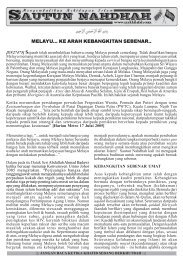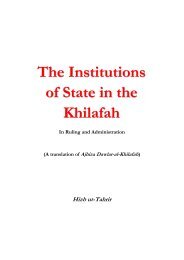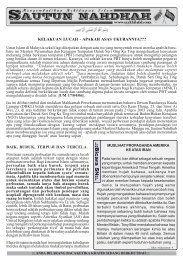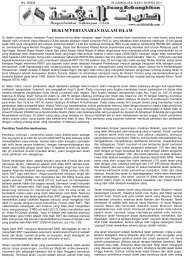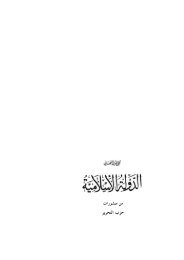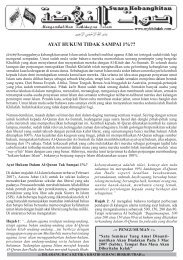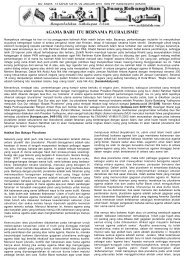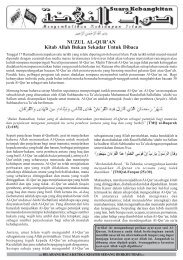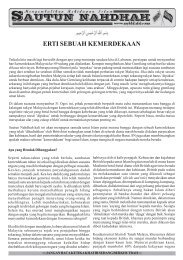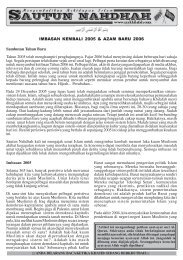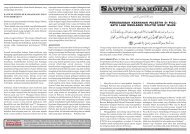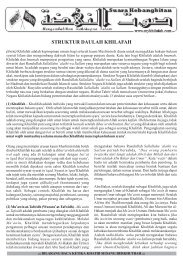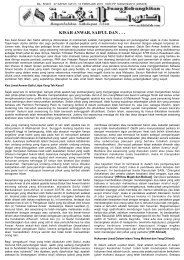A Warm Call from Hizb ut-Tahrir to the Muslims - MyKhilafah.com
A Warm Call from Hizb ut-Tahrir to the Muslims - MyKhilafah.com
A Warm Call from Hizb ut-Tahrir to the Muslims - MyKhilafah.com
You also want an ePaper? Increase the reach of your titles
YUMPU automatically turns print PDFs into web optimized ePapers that Google loves.
82 u A <strong>Warm</strong> <strong>Call</strong> <strong>from</strong> <strong>Hizb</strong> <strong>ut</strong>-<strong>Tahrir</strong> <strong>to</strong> <strong>the</strong> <strong>Muslims</strong><br />
generation can give <strong>to</strong> ano<strong>the</strong>r if <strong>the</strong> nation is ancient and deep rooted<br />
in thought. If <strong>the</strong> material wealth of <strong>the</strong> nation is destroyed, it is possible<br />
for it <strong>to</strong> be res<strong>to</strong>red quickly, as long as <strong>the</strong> nation preserves its intellectual<br />
wealth. However if <strong>the</strong> intellectual wealth collapses and a nation continue<br />
<strong>to</strong> retain only its materialistic wealth, <strong>the</strong>n this wealth will soon diminish<br />
and <strong>the</strong> nation will return <strong>to</strong> poverty. Though <strong>the</strong> reality of <strong>the</strong> Islamic<br />
Ummah is that it is one of <strong>the</strong> wealthiest of nations, if not <strong>the</strong> wealthiest<br />
when her resources are brought <strong>to</strong>ge<strong>the</strong>r in one state as Islam obliges it<br />
<strong>to</strong> be for all <strong>Muslims</strong>. Fur<strong>the</strong>rmore, for <strong>the</strong> economy <strong>to</strong> grow and move<br />
<strong>from</strong> being just agricultural <strong>to</strong> agricultural and industrial such that <strong>the</strong><br />
industry be<strong>com</strong>es <strong>the</strong> spearhead, <strong>the</strong>re must be a strong incentive that<br />
motivates <strong>the</strong> Ummah <strong>to</strong> strive for <strong>the</strong> economy. This strong incentive<br />
does not emanate <strong>from</strong> anything o<strong>the</strong>r than <strong>the</strong> thought. The greatest of<br />
thoughts is <strong>the</strong> intellectual creed <strong>from</strong> which thoughts abo<strong>ut</strong> life<br />
emanate. Therefore, <strong>the</strong> problem is not economic b<strong>ut</strong> ra<strong>the</strong>r intellectual,<br />
i.e. <strong>the</strong> issue of having confidence in <strong>the</strong> thoughts which emanate <strong>from</strong><br />
<strong>the</strong>ir creed.<br />
It is shallow <strong>to</strong> say that <strong>the</strong> problem is one of education and <strong>the</strong><br />
sciences. This is because this means that <strong>the</strong> sciences ra<strong>the</strong>r than <strong>the</strong><br />
thoughts are <strong>the</strong> incentive. Though <strong>the</strong> reality is that thoughts are <strong>the</strong><br />
incentive and sciences are affected by <strong>the</strong> thoughts in terms of elevation,<br />
decline, existence or disappearance. The difference between thoughts<br />
and sciences is that thoughts are <strong>the</strong> viewpoint <strong>to</strong>wards things and<br />
actions, so as <strong>to</strong> define <strong>the</strong> stance <strong>to</strong>wards <strong>the</strong>m. As for <strong>the</strong> sciences,<br />
<strong>the</strong>y are <strong>the</strong> viewpoint <strong>to</strong>wards <strong>the</strong> things <strong>the</strong>mselves, in order <strong>to</strong> gain<br />
knowledge of <strong>the</strong>ir essence. What sets <strong>the</strong> direction of life is <strong>the</strong><br />
thoughts and not <strong>the</strong> sciences. Most scientific thoughts discovered by a<br />
nation, if lost, can be discovered by that nation again as long as she<br />
does not lose her way of thinking. However if she loses her way of<br />
thinking, i.e. loses her thought, <strong>the</strong>n she will soon go backwards and<br />
lose <strong>the</strong> discoveries and inventions she had. Even though <strong>the</strong> Islamic<br />
Ummah has a huge number of students and educated people, which<br />
number in <strong>the</strong>ir millions, this Ummah is still backward in discoveries and<br />
inventions because she does not have thoughts <strong>to</strong> steer <strong>the</strong>se disciplines<br />
and sciences <strong>to</strong>wards a specific aim, thus driving her forward <strong>to</strong> serve<br />
this lofty aim. Moreover, <strong>the</strong>re are scholars and inven<strong>to</strong>rs everywhere<br />
in <strong>the</strong> world who are employees. It is possible <strong>to</strong> bring <strong>the</strong>m <strong>from</strong> any<br />
nation as employees, b<strong>ut</strong> bringing <strong>the</strong>m or <strong>the</strong>ir like will not solve <strong>the</strong><br />
A <strong>Warm</strong> <strong>Call</strong> <strong>from</strong> <strong>Hizb</strong> <strong>ut</strong>-<strong>Tahrir</strong> <strong>to</strong> <strong>the</strong> <strong>Muslims</strong> u 83<br />
problem unless <strong>the</strong>re is thought. Thus <strong>the</strong> issue is one of thought.<br />
It is inaccurate <strong>to</strong> say that <strong>the</strong> problem is one of legislation and laws.<br />
This would mean that canons are <strong>the</strong> basis of life and state, which is<br />
not correct. This is because laws and rules are b<strong>ut</strong> sol<strong>ut</strong>ions <strong>to</strong> <strong>the</strong> daily<br />
problems of <strong>the</strong> people, which emanate <strong>from</strong> <strong>the</strong> viewpoint abo<strong>ut</strong> life.<br />
Thus <strong>the</strong> origin is <strong>the</strong> viewpoint <strong>from</strong> which <strong>the</strong> laws emanate and not<br />
<strong>the</strong> laws <strong>the</strong>mselves. Does one not see that <strong>the</strong> rules implemented on <strong>the</strong><br />
Kuffar citizens of <strong>the</strong> Islamic state were <strong>the</strong> same as those implemented<br />
on <strong>the</strong> <strong>Muslims</strong>, and <strong>the</strong>re was no difference between <strong>the</strong>m and <strong>the</strong><br />
<strong>Muslims</strong> regarding <strong>the</strong>se rules So <strong>the</strong> <strong>Muslims</strong> and <strong>the</strong> Kuffar were equal<br />
before <strong>the</strong> judge and ruler. Despite this, <strong>the</strong> <strong>Muslims</strong> in <strong>the</strong> Islamic State<br />
were <strong>the</strong> people of <strong>the</strong> Risalah, <strong>the</strong> carriers of <strong>the</strong> Da'wah, and revival<br />
(Nahda) was exemplified in <strong>the</strong>m. This was while <strong>the</strong> Kuffar were under<br />
<strong>the</strong> shadow of Islam, paying <strong>the</strong> Jizyah with willing submission and<br />
feeling subdued. Then does one not see <strong>to</strong>day how <strong>the</strong> <strong>Muslims</strong> in most<br />
areas of <strong>the</strong> world have <strong>the</strong> Western legislation and laws applied on<br />
<strong>the</strong>m, yet <strong>the</strong>y still profess <strong>the</strong> Islamic ‘Aqeedah, whereas <strong>the</strong>se laws do<br />
not emanate <strong>from</strong> <strong>the</strong>ir ‘Aqeedah, ra<strong>the</strong>r <strong>the</strong>y emanate <strong>from</strong> what became<br />
public opinion amongst <strong>the</strong>m Despite this <strong>the</strong>y did not catch up with<br />
<strong>the</strong> West in Nahdhah (revival) and nor are <strong>the</strong>y intellectually elevated.<br />
They are still declined and behind <strong>the</strong> West by centuries and generations,<br />
even though Western laws have been applied on <strong>the</strong>m since 1918. All this<br />
indicates that <strong>the</strong> issue is not legislation and laws, b<strong>ut</strong> <strong>the</strong> viewpoint<br />
abo<strong>ut</strong> life <strong>from</strong> which <strong>the</strong> laws emanate. In o<strong>the</strong>r words, it is <strong>to</strong> make <strong>the</strong><br />
‘Aqeedah <strong>the</strong> source of <strong>the</strong> laws and <strong>the</strong> confidence in <strong>the</strong>ir suitability, or<br />
<strong>to</strong> make <strong>the</strong> law emanate <strong>from</strong> an ‘Aqeedah. The problem, <strong>the</strong>refore, is<br />
one of confidence in <strong>the</strong> laws in terms of <strong>the</strong>m emanating <strong>from</strong> <strong>the</strong><br />
‘Aqeedah, i.e. <strong>the</strong> problem is <strong>the</strong> viewpoint abo<strong>ut</strong> life or what is known in<br />
<strong>the</strong> modern age as 'ideology'.<br />
Consequently, <strong>the</strong> problem relates <strong>to</strong> <strong>the</strong> <strong>Muslims</strong> as an Ummah and as<br />
an Islamic Ummah. The problem of <strong>the</strong> Islamic Ummah is not solved by<br />
generating <strong>the</strong> Islamic ‘Aqeedah in her and nor is it by streng<strong>the</strong>ning <strong>the</strong><br />
economy or by elevating <strong>the</strong> level of education and culture. It is also<br />
not solved by <strong>the</strong> reform of legislation or creation of a constit<strong>ut</strong>ion and<br />
laws for her. Ra<strong>the</strong>r <strong>the</strong> sol<strong>ut</strong>ion is <strong>to</strong> link her ‘Aqeedah with her<br />
constit<strong>ut</strong>ion and laws. It is <strong>to</strong> make <strong>the</strong> decisive belief, which accords<br />
with <strong>the</strong> reality and is present within <strong>the</strong> Ummah, focused on <strong>the</strong> thoughts<br />
1<br />
2<br />
3<br />
4<br />
5<br />
6<br />
7<br />
8<br />
9<br />
10<br />
11<br />
12<br />
13<br />
14<br />
15<br />
16<br />
17<br />
18<br />
19<br />
20<br />
21<br />
22<br />
23<br />
24<br />
25<br />
26<br />
27<br />
28<br />
29<br />
30<br />
31<br />
32<br />
33<br />
34<br />
35<br />
36<br />
37<br />
38<br />
39



